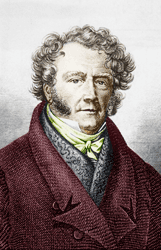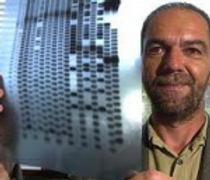Innovators
People


Francois Vidocq (1775-1857)
He was and early pioneer innovator of France and was first a criminal before transferring to a criminalist. His past experience gave him advantages to catching other criminals. Francois became founder and first director of the crime-fighting Sûreté Nationale. He helped other officers and forensics. Francois also made some of the first impression evidence of plaster footprints for evidence comparison. His advancements have allowed present forensic scientist to better his strategies and take more criminals off the streets. (C.12)
Image of Francois Vidcoq and a plastered footprint (I.11) (I.12)
Sir Alec Jefferys (1950-Present)
Jeffery has managed to help criminal investigations around the world with his work developing techniques for DNA fingerprinting and DNA profiling. In 1984 he invented and developed DNA fingerprinting techniques. Jeffery's new techniques has allowed in the past, and currently, for officers to catch criminals from kidnappers to rapist. This method has also helped free convicts that have been wrongly committed of a crime. His invention allowed his colleagues to determine whether bones discovered at a U.K. car park were the remains of King Richard III. His contributions led to him receiving the Distinguished Honorary Fellowship at the University of Leicester in the early 2000s. In 2012 Jeffery retired from the University of Leicester. (C.29)

Image of Sir Alec Jeffery and his DNA fingerprinting technique. (I.26)

NFSTC logo (I.27)
National Forensic Science Technology Center
NFSTC is a modern innovation center of forensics. This center is under the Forensic Innovation Center (FIC). This company will progress forensic intelligence services and centralize innovative direction for the industry. The FIC provides biometric technology including DNA, forensic science consulting, and research, development, testing and evaluation of advanced forensic intelligence tools. (C.13)
Companies
CODIS
CODIS is a modern innovation which is short for “Combined DNA Index System” and is the generic term used to describe the FBI’s program of support for criminal justice DNA databases as well as the software used to run these databases. This database contains thousands of DNA profiles from evidence that can be searched against the state's database of crime scene DNA profiles called the Forensic Index. These profiles allow forensic scientists to have easier access to compare DNA. A familial DNA search could allow the a sample given to find the individual's relatives (mother, brother, etc.) with a prior record. No names or other personal identifiers of the offenders, arrestees, or detainees are stored using the CODIS software. Legal issues have been debated about this technology. (C.14) (C.22)

CODIS logo (I.28)